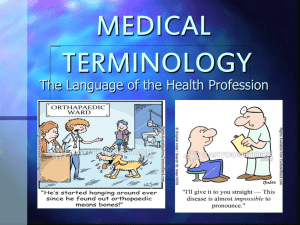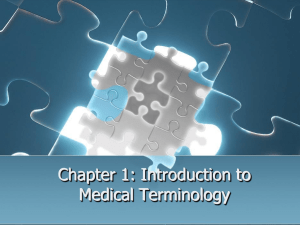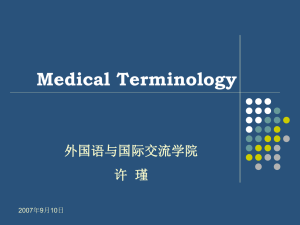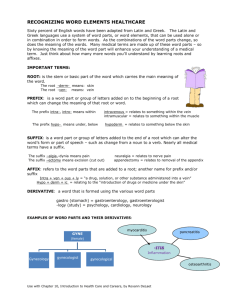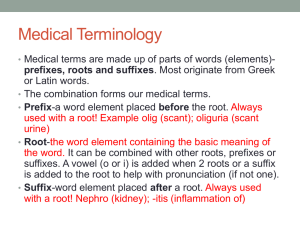hw_week_1 - Homework Market
advertisement
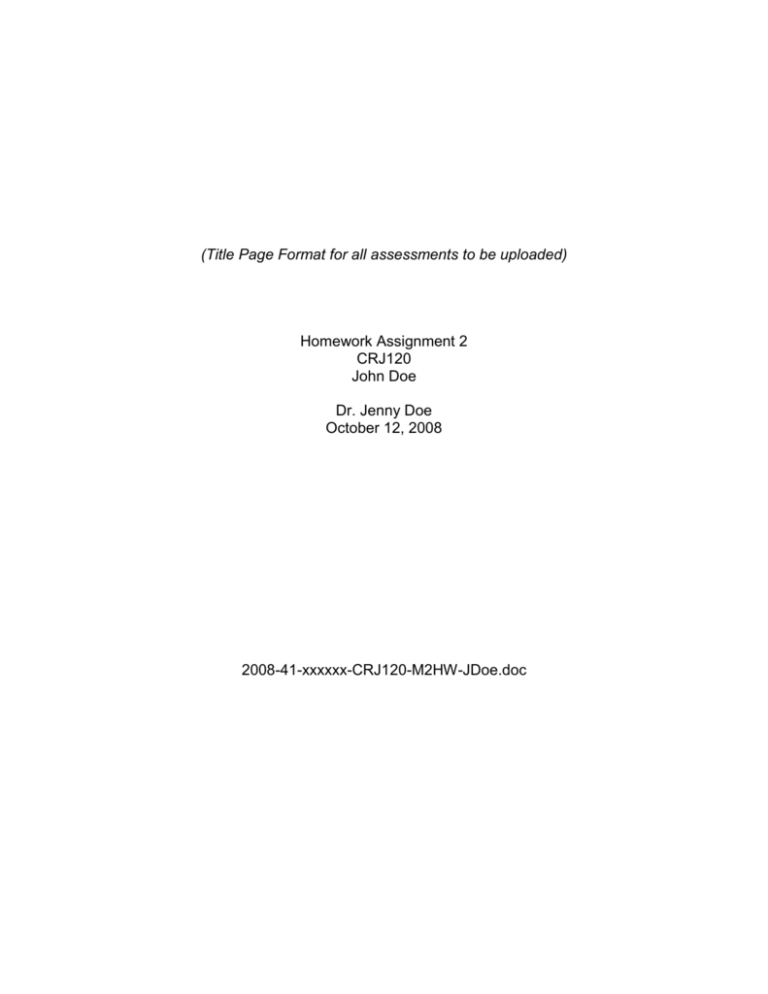
(Title Page Format for all assessments to be uploaded) Homework Assignment 2 CRJ120 John Doe Dr. Jenny Doe October 12, 2008 2008-41-xxxxxx-CRJ120-M2HW-JDoe.doc (Cover Page Format for research and all other projects) The Dynamics of the Psyche According to Jung: A Burkean Dialectic John Doe COM420: Philosophy of Communication Professor Jenny Doe September 15, 2008 2008-41-xxxxxx-COM420-FP-JDoe.doc Q #01…Analyze how medical terminology is broken down in to word parts by choosing 4 terms and describing how each term can be broken down. Answer: Medical terminology is a special vocabulary used by health care professionals for effective and accurate communication. Because it is mainly based on Greek and Latin words, medical terminology is consistent and uniform throughout the world. Medical terms can be broken down in to word parts. Actually medical terms are difficult to understand so for the convenience medical terms can be broken down in to 4 fundamental elements. These four parts are : Prefix Root word Combining Vowel Suffix Prefix : Prefix is a word that comes before the root/stem word and modifies the meaning of the root word. “Pre” means “before”. So, prefix is a word that is in the begnining of the word or before the root word. It can be used to describe the location,number,time,size and it can change the meaning of the root word. Some examples are as follow: Prefixes Meanings 1 An-.AWithout/ lack of 2 HyperExcessive/ high/ above 3 HypoLow/ below/ beneath 4 5 6 7 BiPrePostEcto- Two/ both Before After Outside Examples Anaemia means lack of RBCs, Asystole means no contraction of the heart. Hyperglycemia means excessive glucose in blood, hyperthermia means high body temperature. Hypoglycemia means low glucose in blood, hypothermia means low boby temperature,hypothalamus means below or beneath the thalamus. Bilateral means both sides, bilobed means two lobes. Prenatal means before birth. Postnatal means after birth. Ectopic pregnancy means pregnancy outside the uterus or uterine cavity. Root/Stem Word: Root or stem word is that part of the term that contain the essential meaning of the word. It usually refers to a structure and/or function of the body. Some medical terms contain more than one root. For example, electrocardiogram contain two root word i.e., “electr” meaning electric and “cardi” meaning heart and gram is the suffix. So, this word contain two root words and one suffix. Prefix and suffix is attach to root word to modify its meaning. Some examples of root words are as follow: 1 2 3 4 5 Root/ Stem Word CardiArthrBlepharNephrRhin- 6 Gastr7 Cerebr/o Meanings Examples Heart Joint Eyelid Kidney Nose Stomach Brain Cardiology means study of heart. Arthritis means inflammation of joints Blepharitis means inflammation of eyelids Nephrolithiasis means stones in the kidney. Rhinoplasty means plastic surgery of brain, rhinitis means inflammation of nose. Gastrectomy means removal of stomach. Cerebrospinal fluid means fluid in the brain and spinal cord Combining Vowel/ Combining Form: As medical terms are compound words, a combining vowel is used to join the elements of the word so that it become easy to pronunce. A combining vowel is a word usually a vowel( o, i ) that join the elements of the word and it have no meaning of its own. A combining form is a root with an added combing vowel which the root usually carries when used in combination with another element. There are different rules for combining vowel,these are as follow : 1. If you join root to root or root to suffix then do not use combining vowel if the suffix begin with another vowel or if the root word end with a vowel and suffix start with the same vowel. 2. Most often, insert combining vowel between two roots even when the 2nd root begins with vowel. 3. when you join root with root or root to suffix keep the vowel if the suffix or root begins with consonant. 4. A Combining Vowel is always used when 2 or more root elements are joined. In the dictionary, the vowel is separated from the root with the slash mark. Some of the examples of combining form are as follow : 1 2 3 4 5 6 7 Combining Form Gastr/oHepat/oCardi/o Gloss/oKerat/oBronch/oAngi/o- Meanings Stomach Liver Heart Tongue Cornea Bronchus Vessel Examples Gastroenteritis Hepatomalcia Cardiotoxic Glossopharyngeal Keratoconjunctivitis Bronchopulmonary Angiography Suffix : Suffix is a word that comes after the root word or a suffix is a word that comes at the end of the term. It modifies the meaning of the root word.Normally, when reading or breaking down a medical word, begin with the suffix. Some of its examples are as follow: 1 2 3 4 5 6 7 Suffix -itis -emia -megaly -oma -pathy -ectomy -trophy Meanings Inflammation Blood Largy Tumor mainly benign Disease Excision/ removal Growth Examples Gastritis, hepatitis Hypoglycemia, leukemia Hepatomegaly, cardiomegaly Lipoma, sarcoma Nerurpathy Nephrectomy Hypertrophy Now analyze the medical term and broke it in to its part by taking the examples of a full medical term : Gastroenteritis Gastr root word Gastro combining form -itis suffix Gastroenteritis medical term Meaning inflammation of stomach and intestine Myocarditis Myo prefix Cardi root word -itis suffix Myocarditis medical term Meaning inflammation of muscles of heart hyperlipoproteinemia hyper prefix lip root o vowel used to create a combining form, lipoprotein root -emia suffix Meaning excessive fat and protein in the blood Q #02…Explain the role of “root” or “combining form”. Why is it important to learn the meaning of combining form? How does the combining form affect the overall meaning of a medical term? Answer : Root or stem word is that element of the medical term that gives the essential meaning to that term e.g. cardi, gastr, osteo etc. combining form is the root word plus combining vowel e.g. cyt/o, gastr/o, cardi/o etc. Root word or combining form have a special role in the medical term. They give the meaning to the medical term and also join the root word with another root word or with a suffix . Once the root word can be recoginized then the term become easier to identify. For example, in gastrotomy, if we identify the root or combining form then the meaning of the term become clear. Here gastr/o is a combining form and it means related to stomach. A combining vowel may be added between the root and the suffix. Thus, when the suffix –logy, meaning “study of” , is added to the root neur,” meaning nerve or nervous system”, a combining vowel is added: Neur + o + logy = neurology(study of nervous system) Roots with a combining vowel is called combining form. A combining vowel usually is not used if the ending begins with the vowel e.g. the root neur is combined with the suffix –it is, meaning ”inflammation”, so, Neur + itis = neuritis(inflammation of a nerve) A combining form can affect the overall meaning of the medical term because one combining form can give rise to many medical terms and each term have different meaning but origin is from same combining form or from same root word. e.g. Gastr/o Gastrotomy Gastroenteritis Gastrointestinal Gasteroesophageal Gastronomy Cardi/oCardiology Cardiovascular Cardiography Cardiogenic Cardiolipin Many other similar examples can explain that the single combining form affect the overall meaning of the medical terms. So, it is very important to know the meaning of the combining form. Q #03... Describe the functions of a suffix. What role does the suffix plays in the meanings of medical term? Answer: Suffix is a short word part or series of parts added at the end of a root to modify its meaning. The function of suffix is as follow: Suffix can modify the meaning of the root word. A suffix may indicate that a word is a noun or an adjective and often determines how the definition of the world will begin. For example, using the root myel/o, meaning “bone marrow”, the adjective ending –oid forms the world myeloid, which means “like or pertaining to bone marrow”. The ending –oma produces myeloma, which is the tumor of the bone marrow. Adding another root,gen, which represent genesis or origin, and the adjective ending –ous forms the word myelogenous, meaning “originating in bone marrow”. Some suffixes have more than one meaning. Some multiple suffixes have a particular meaning. For example, -ac, -al, -ar, -ary, -eal, -ic, -ous and –ic means “pertaining to.” Cardiac (pertaining to the heart), cellular (pertaining to the cell), physchotic(pertaining to psychosis) and corporeal (pertaining to the body). Normally, when reading or breaking down a medical word, begin with the suffix. For example, electrogram Suffix can give the meaning to the root word. Some examples are as follow: -itis (meaning inflammation) Gastritis Enteritis Endocarditis Hepatitis Encephalitis Urethritis Esophagitis Meningitis Appendicitis It is very clear from the example that -itis means inflammation and these all are the inflammatory conditions of the body. So a single suffix impart the meaning of inflammation to different root words. Q #04… Identify the importance of prefix. What are some function of prefix? How does a prefix alter the meaning of a medical term? Answer: A prefix is a short word added before a word or a root word to modify its meaning. For example, the word “lateral” means “side”. Adding the prefix “uni-”, meaning “one”, forms unilateral, which means “affecting or involving one side.” The functions of prefix are as follow: It can modify the meaning of the root word. The fundamental function of all the prefixes is to relate the action of the verb in some way to the subject, and thus to define it in various ways. Prefixes defines the action, color, location/position, time, direction, orientation, negation, size and the meaning of the root word. Prefixes can alter the meaning of a medical term. For example, Glycemia (meaning glucose in blood) We can add two prefixes to glycemia i.e., hyper- and hypo- and the meaning of glycemia will alter. So, Hyperglycemia (meaning high level of glucose in the blood ) Hypoglycemia (meaning low level of glucose in the blood) Similarly, Partum ( meaning labor) We can add three prefixes to partum i.e., pre-, intra-, post-, and by adding these prefixes the meaning of partum will change. So, Prepartum (meaning before labor) Intrapartum (meaning during labor) Postpartum (meaning after labor) It is very important to know the meaning of the prefixes. References: Medical terminology: A short course (6th Edition). St. Louis: Saunders Elsevier. Introduction to Medical Terminology part 1. An Introduction to Medical Terminology by Andrew Hutton. http://quizlet.com/11800255/suffixes-prefixes-work-root-and-combinatinos-flashcards/ Thank you

